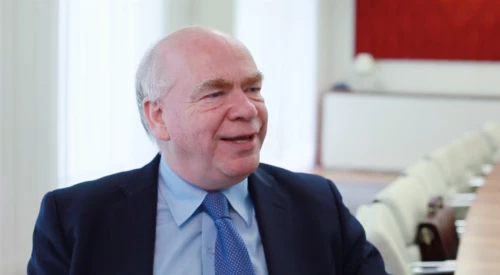Sir Lawrence Freedman, professor of war studies at King’s College London, is regarded as one of the world’s leading authorities on war and international politics. He has written extensively on these topics. His most recent book, Strategy: A History, provides a definitive account of the development of strategy, not only in the military sphere but also in business, politics, and beyond.
Sir Lawrence recently spoke with Martin Reeves, a senior partner and managing director in the New York office of The Boston Consulting Group and leader of The Strategy Institute, BCG’s vehicle to detect, capture, and develop ideas from within and beyond business that have the potential to impact how companies think about strategy and competitive advantage. Edited excerpts of the discussion follow.
We’re joined today by Sir Lawrence Freedman, professor of war studies at King’s College London. Sir Lawrence, thank you very much for joining us today to discuss the evolution of strategy. Some people have questioned the relevance of business strategy, given the turbulent and unpredictable world we live in. In the military sphere, is strategy still relevant?
In the military, strategy is very important. What you’ll find, actually—certainly in Britain—is that the military have been complaining that there isn’t enough strategy and that their political masters don’t think sufficiently far ahead and aren’t clear enough about what they are trying to achieve. Now I think that, sometimes, the military have an unrealistic expectation of what strategy can do for them, since the whole experience of warfare is that as soon as you get into a campaign, the circumstances turn out to be quite different from those that you were anticipating: the enemy does things you weren’t expecting. But strategy development is a way of thinking. It’s a way of starting to plan a campaign to work out what you’re trying to do and how you might achieve it.
If the unpredictability of warfare or business means that the plan will not survive the first contact with reality, in what sense is a plan relevant?
Eisenhower once said that plans are useless but planning is essential. The process of thinking through and of working out possibilities enables you to cope with situations as they arise and to recognize that things are different. But if you stick rigidly to a plan, you’ll get into trouble because, inevitably, things will turn. So my approach to strategy has been not to see it as something that’s governed by objectives but rather as something that is governed by the starting problem—by the here and now.
One narrative of business and military strategy is that the world is a lot more unpredictable today and that we need, therefore, a different type of strategy. Another plausible view is that this has always been the case. What is your view on whether strategy has, in fact, evolved and how it has evolved?
I think the whole point about the early attempts at strategic thinking was that it was about control: How is it that, by out-thinking your opponent, you can control the environment into which you’re moving? And this assumed that you have some very basic core strength to start with that you could deploy. We don’t have that same sense of control anymore. It’s much more responsive, much more fluid, much more adaptive.
Military strategy is, of course, a much older discipline than business strategy, which is still comparatively young. Does business strategy still have a lot to learn from military strategy, vice versa, or both?
I think business and military strategy need to pay attention to each other. Business strategy probably pays more attention to military strategy. But they’re from a very sort of old-fashioned view of what it’s about. They go back to Clausewitz, and it’s about whether you should mount a frontal assault or not, or how you hold territory. A lot of military strategy—because of the sort of campaigns that have been fought over recent times, especially since the end of the Cold War—has become much more varied and fluid and has raised a lot of the issues that a business strategist would recognize, such as telling a narrative or telling a story: How do you persuade people rather than just beat them up? So I think there is a lot to learn. But there isn’t, at the moment, I would say, a great deal of dialogue between the two approaches.
We use the same word—strategy—in both disciplines, military and business. But are these actually fundamentally different problems or are they essentially the same?
There’s a generic approach that I think can be followed. But when you’ve said that, obviously, military strategy involves violence. And that colors everything because it raises exceptional ethical, legal, and political problems that shape the way it develops. Business strategy has its own ethical, legal, and political problems. But they’re quite different. It’s about making money; it’s about sustaining an organization. It may not have always the sense of conflict that’s at the heart of military strategy. But that doesn’t mean that some basic themes and ideas can’t work across.
What do you think are some of the most interesting problems in strategy today that you think we can learn from?
The way that we approach problems is affected by basically the social and economic structures of which we’re a part. The digital age—and the resulting ease of communication—has made a lot of difference. It means it’s possible to gather information in ways that would not have been possible before and to interpret and analyze that information in new ways. But it also means that you’re able to put out your ideas, not necessarily as a form of information but rather as a narrative of some sort—as a story of some sort—to make an impact.
How all that works, people are still working through, I think. The challenge at the moment, I think—which you can see in business, politics, and the military—is to find ways of adapting to the new possibilities opened up by the digital age but also to be aware that there are new dangers there, too: that it can be overwhelming, that your messages can get lost, but also that you’ll be found out. One of the most important features of military strategy is that you get found out very quickly if you’ve got it all wrong. Business strategy can sometimes take longer, but in the end, you’ll be found out. The digital age possibly means you’re going to be found out more quickly.
Whether in business or the military sphere, where do you think the next big advances in strategy will come from?
You can see two big areas. The first is the systems that are now being developed for drawing upon, collating, and interpreting different sources of information, including information about what other people are thinking. The second, which is quite different, is recognition that strategy is an art. There’s a scientific basis to it, but in the end, it’s an art. We’ve learned an awful lot from developments in cognitive psychology about how people think, about what they respond to, about biases, about framing. That, I think, is something that needs to be incorporated into the way that ideas about strategic action are developed and communicated.
What do you think that business leaders and practitioners of strategy should be reading about to avail themselves of the latest thinking in strategy?
I think there’s a move away from the sort of business strategy literature that was very popular in the ’80s, ’90s, and even the last decade, which was prey to fads and fashions: sort of the idea that there’s a formula here that, if only if you apply it to your business, you’re bound to be successful. I think that problems now vary enormously, and you’re drawing, therefore, on a body of knowledge and experience that’s out there. But you need to get your diagnosis right. So it’s a more realistic, pragmatic approach, which I'd say someone like Richard Rumelt has got down very well. It’s not as exciting, possibly, as some of the Tom Peters books. But it actually may be, in the end, more useful.
Thank you very much, Sir Lawrence, for sharing your perspectives with us on the history and evolution of strategy.






